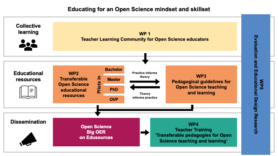Transferable pedagogies for an Open Science mindset and skillset
In the coming years, Open Science needs to find its way into the curricula of Utrecht University (UU) at all levels of education. In this project, Open Science educators representing all faculties will join forces to identify the core Open Science values shared across all disciplines and translate this ambition into concrete educational strategies.
Background information
Open Science is one of the main priorities of the UU. The transition toward Open Science should also be reflected in how a new generation of academics and citizens are educated. Our educational strategy ‘New Utrecht School’ is very clear about this: ‘the aim of university (medical) education is to prepare future graduates to share their (inter)disciplinary knowledge, engage with societal stakeholders, and shape tomorrow’s society’. This project establishes essential collaborations between teachers across all faculties to realize this important goal.
Utrecht University has embraced an Open Science (OS) mindset and skillset as a pivotal attribute of its graduates and it is to be expected that, in the coming years, many initiatives to ‘educate for Open Science’ will be developed and integrated in UU-programs at all levels. With this project we want to create coherence among these initiatives and offer educators guidelines and resources, that can prevent them from reinventing the wheel.
As a starting point we will use the following overarching learning goals for an Open Science mindset and skillset, based on the internationally agreed definition of Open Science in UNESCO’s Recommendation on Open Science
Open Science educational activities help students to articulate why and how to:
- Increase scientific collaborations and sharing of information for the benefits of science and society;
- Make multilingual scientific knowledge openly available, accessible and reusable for everyone;
- Open the processes of scientific knowledge creation, evaluation, and communication to societal actors beyond the traditional scientific community.
Project description
Within this project we have formulated five work packages (see figure 1).

Figure 1. Project overview
WP1 describes the activities for building an interdisciplinary teacher learning community (TLC).
WP2 describes the activities for pilot-testing OS-ER and creating an Open Science Big OER [8] on Edusources. The pilots of TLC-members will represent all four levels of UU education and a variety of disciplines (see Fig 1.).
WP3 is closely intertwined with WP2. Where WP2 focusses on the practical output in terms of educational resourses and designs, WP3 has a more theoretical focus. The OS educational framework will be used as a starting point to develop pedagogical guidelines and an Educational Design Research (EDR) approach [9] will be used to refined and test the guidelines. In this process, TLC members will:
WP4 entails the development of a teacher training aimed to empower teachers to develop their own Open Science learning activities and to transfer available OS-ER to their own disciplinary and educational context. TLC members will:
WP5 groups all the activities in the project concerning the evaluation and educational research on the products as well as the collective learning processes in this project. (see section ‘Evaluation of the innovation’ for details)
Aims
The project aims to create an inclusive learning community to identify and address the educational needs related to Open Science across disciplines and at all levels of education.
Results and conclusion
The project will deliver Open Science educational resources and pedagogical guidelines for Open Science teaching and learning that do justice to the differences between disciplines while articulating and stimulating the common values and virtues of Open Science as attributes for all graduates of Utrecht University.
We plan to:
- Identify and create an interdisciplinary Teacher Learning Community (TLC) [7] (WP1). This community will foster professional development of Open Science educators and help to recognize and reward their efforts. The community will grow beyond the initial project members and will become the heart of Open Science teaching and learning expertise in and outside UU. The community is called COSiE, find our community on Edusources.
- Deliver an online collection of Open Science educational resources (OS-ER) that are tested and (re)designed in such a way that they are transferable and (re)usable in different disciplines and contexts (WP2). This Open Science Big OER [10] will allow educators to build on each other’s work and prevent them from reinventing the wheel. It will also be a source for student-centered activities in which students co-create Open Science educational activities (see example in plan of approach).
- Create pedagogical guidelines for Open Science teaching and learning (WP3). These guidelines will form the theoretical and practical underpinning of Open Science education thereby contributing to quality and coherence of Open Science teaching and learning at UU.
- Create a teacher training on ‘Transferable pedagogies for Open Science teaching and learning’ (WP4). The teacher training will invite and encourage teachers outside the TLC to adopt Open Science teaching and learning in their education.
- Apply a research-informed, scholarly approach to develop and evaluate the project (WP5). This scholarly approach will assure that theory and practice reinforce each other in such a way that UU can build on this project to further strengthen Open Science in UU education.
References
- H. Kummeling, M. Kluijtmans, and F. Miedema, De Universiteit in Transitie, Preprint. Publishers of Trial and Error, 2023. doi: 10.36850/9pv6-n457.
- L. Wijngaards-de Meij, K. Zunderdorp, M. Groenouwe, and S. De Knecht, ‘Plan of action Open Education’. 2023. [Online]. Available: https://www.uu.nl/en/media/95608
- F. Azevedo et al., ‘Towards a culture of open scholarship: the role of pedagogical communities’, BMC Res. Notes, vol. 15, no. 1, p. 75, Dec. 2022, doi: 10.1186/s13104-022-05944-1.
- C. K. K. Chan and M. Fai Pang, ‘Teacher Collaboration in Learning Communities’, Teach. Educ., vol. 17, no. 1, pp. 1–5, Mar. 2006, doi: 10.1080/10476210500527899.
- S. McKenney and T. C. Reeves, ‘Educational design research: Portraying, conducting, and enhancing productive scholarship’, Med. Educ., vol. 55, no. 1, pp. 82–92, 2021, doi: 10.1111/medu.14280.
- B. Hegarty, ‘Attributes of Open Pedagogy: A Model for Using Open Educational Resources’, Educ. Technol., 2015.
